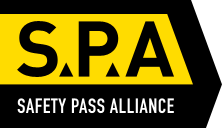A growing number of business sectors in the UK are now embracing safety passport schemes to help reduce accidents and improve efficiency in their companies.
Major corporations in food and drinks, construction, and petroleum and oil, are among those that have implemented the safety passport culture and have cut their accident statistics.
The passport schemes have been developed by the UK’s leading authority in health and safety passport schemes, Safety Pass Alliance (SPA) Ltd., based in Rugby, Warwickshire.
Ray Gibbs, SPA’s managing director, said: “Most companies require contractors to enter their premises to carry out vital work such as repairs, maintenance and installation of new equipment.”
“Unfortunately, contractors can pose an unknown risk to existing safety procedures as it’s not always possible to ensure that individual contractors’ employees have been trained to an acceptable level of health and safety awareness specific to their own industry.”
He went on: “This is where the SPA Passport scheme is a huge benefit. Contract workers and employees who successfully complete the training course can prove their awareness of basic principles of health and safety in the workplace by showing their safety passport.
“The Passport scheme benefits the bottom line of both the client and contractor as it reduces the time needed to be spent on site inductions. It also provides the peace of mind that only a common, recognised and validated standard of training can provide.”
A new safety passport scheme, developed specifically for the pharmaceutical sector, is the latest to be launched by SPA. It will be pioneered by Eli Lilly, one of the UK’s top pharmaceutical companies.
The company has told 160 contractor organisations that their employees will not be allowed into the company’s Basingstoke manufacturing site from September 1 unless they hold a valid safety passport.
It is expected that hundreds of contractors’ employees will attend the new two-day health and safety training courses that provide specific information about hazards in the pharmaceutical industry.
Will Hooper, Eli Lilly’s environmental health and safety adviser who has been involved in developing a pilot scheme for the industry, said: “We got involved because we saw the very positive track record that SPA has achieved in other industry segments.
“There is not only anecdotal evidence but hard data that demonstrates that the safety passport scheme can reduce accidents.”
He went on: “Our industry is not as high risk as some other sectors like construction, but we do have specific risks. For example, working with pharmaceutical compounds can be a hazard. A contractor entering a process room would not be able to physically see a hazard caused by a concentration of dust – but he must be trained to understand the dangers.”
Will added: “The new safety passport scheme is another tool in the bag for us to raise our safety standards. The bottom line is that we shall have more control and confidence in what contractors are doing when they visit us.”
The passport is a robust and secure card – similar to a UK driving licence – that displays a tamper-proof photograph of the successful trainee. The photocard features a special ultra-secure ‘holocote’ finish to prevent fraud.
One of the first sectors to benefit from safety passports was the food and drinks industry. SPA developed a scheme at the request of the sector and involved leading companies such as Nestle UK, Northern Foods, Geest, Kellogs Europe, Cadbury Trebor Bassett and Bass Brewers.
Contractor organisations such as the Processing and Packaging Machinery Association also played a role in validating the training material.
Ian Burke, group safety manager for Nestle UK, said the company was visited by thousands of contractors each year. “We have made it clear that we will only do business with those contractors who ensure that their employees have been through the scheme and have been awarded their passports,” said Ian.
“We have found that the passport scheme not only reduces our costs – it takes less time to conduct safety inductions – but it has had a dramatic effect on accident rates among visiting contractors.
“We have found our rates have reduced by 68 per cent over the past two years.”
In the public sector Leicester City Council was the first local authority in England to introduce a safety passport scheme for its housing maintenance operatives. The council has seen a 32 per cent drop in its accident rates in the last three years.
“A large part of this reduction is directly attributable to a greater awareness brought about by the introduction of the safety passport scheme,” said Frank Imms, senior health and safety adviser of Leicester City Council.
He said that 840 employees had been put through the passport scheme, 520 of which were trades people who completed the tailor-made health and safety training course on building maintenance that provides them with a safety passport.
“Both the number and severity of accidents have reduced considerably,” said Frank. “Nowadays we are looking towards zero tolerance and don’t want any accidents. The culture has changed so that people are constantly thinking about their safety and the safety of others.
“Customer care is also important. One of our mantras is that the part of a home where our operatives have worked should be the cleanest and tidiest part when they have finished the job.”
He said that last year operatives from the council’s housing technical services department had carried out 201,866 repairs ranging from gas servicing to routine repair work. The number of visits to tenants’ homes was much higher.
The safety passport scheme is specifically for people engaged in building maintenance. It includes training on customer care, power tools, occupational health, asbestos awareness, and access and egress.
“In addition to the passport scheme we also deliver specific training on a range of subjects including manual handling, scaffolding awareness, accident investigation, stress awareness and fire safety,” said Frank.
“We are now starting to put our employees through an upgrade safety passport scheme that takes account of recent changes in legislation.”



















